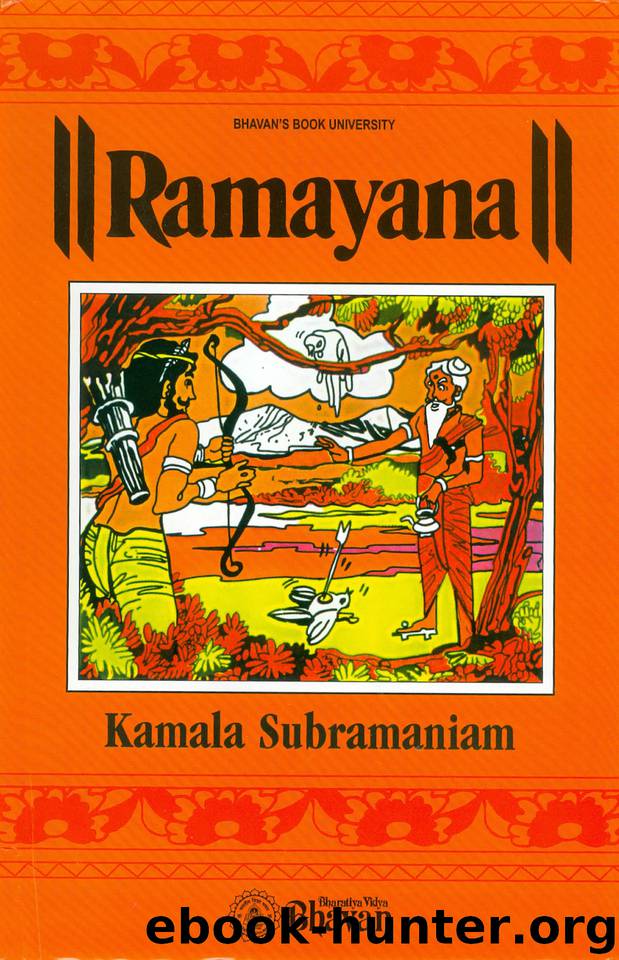Ramayana by Subramaniam Kamala

Author:Subramaniam, Kamala [Subramaniam, Kamala]
Language: eng
Format: epub, mobi
Publisher: Bharatiya Vidya Bhavan
Published: 2018-09-02T16:00:00+00:00
25. A RAY OF HOPE
Rama and Lakshmana prepared a very large pit, and a deep one as indicated by Kabandha and filled it half with wood and, after placing Kadandha in it, they covered it with more wood along with his severed hands. They set fire to it and it took a long time to burn fully. Lakshmana said: “Rama, after Sita was carried away we prepared a pyre for Jatayu and burnt him. Now we are doing it again for Kabandha. I wonder if there will be a third cremation to be undertaken !”
When the body had been consumed fully there arose out of the fire Dhanu, the divine being. He was as handsome as he said he was and dressed in divine ornaments and silks he was a rare sight. A chariot had arrived to take him.
Dhanu told Rama: “I will tell you how to set about your quest for Sita. There are six different factors which are needed to know the truth about anything. These six lead you to the truth. They are Pratyaksha , that is, what has been seen actually. The next is Anumana , conjecture: meaning, arriving at some conclusions on the basis of what one has seen. The third is Upamana : comparison to something which is similar and so, guessing by comparison. The fourth is Shabda which evidently means trying to get at the truth by means of noises made and such like. The fifth is Anuphalaprati which means: making certain that it is not there because it is not found And the sixth is Arthaprapti : guessing and arriving at the truth with the help of the other five and the knowledge obtained by the other five.
“A man who is in some kind of trouble will find a sympathetic friend in another who has had similar sufferings. Lakshmana and you are going through a difficult time. Rama, you have lost your wife. I know of one whose friendship should be sought by you. I have thought about it and this is the best way. You will achieve your end if you follow my advice and meet this person. I will tell you all about him.
“There is a monkey chieftain and his name is Sugriva. He is the brother of Vali, the son of Indra. Vali has been harassing Sugriva and has driven him out of his kingdom. Sugriva is a good soul and he has a fear of Adharma. With four monkeys as companions he is living now in the mountain by name Rishyamooka. The mountain is on the banks of the lake Pampa which is very picturesque. Sugriva is quite a good-looking monkey, brave, powerful and he is true to his word. He is highly intelligent and skilful in many fields. His strength is proverbial and he is the person who must be sought out by you to help you in your hour of need. He will be a good friend and he will help you. Rama, do not indulge in grief but proceed towards Pampa and Rishyamooka.
Download
This site does not store any files on its server. We only index and link to content provided by other sites. Please contact the content providers to delete copyright contents if any and email us, we'll remove relevant links or contents immediately.
| Chakras | Gandhi |
| History | Rituals & Practice |
| Sacred Writings | Sutras |
| Theology |
Fingersmith by Sarah Waters(2531)
Kundalini by Gopi Krishna(2177)
Wheels of Life by Anodea Judith(2140)
Indian Mythology by Devdutt Pattanaik(1930)
The Bhagavad Gita by Bibek Debroy(1918)
The Yoga of Jesus: Understanding the Hidden Teachings of the Gospels by Paramahansa Yogananda(1845)
Autobiography of a Yogi (Complete Edition) by Yogananda Paramahansa(1809)
The Man from the Egg by Sudha Murty(1802)
The Book of Secrets: 112 Meditations to Discover the Mystery Within by Osho(1658)
Chakra Mantra Magick by Kadmon Baal(1637)
The Sparsholt Affair by Alan Hollinghurst(1581)
Gandhi by Ramachandra Guha(1524)
Sparks of Divinity by B. K. S. Iyengar(1520)
Avatar of Night by Tal Brooke(1515)
Karma-Yoga and Bhakti-Yoga by Swami Vivekananda(1487)
The Bhagavad Gita (Classics of Indian Spirituality) by Eknath Easwaran(1475)
The Spiritual Teaching of Ramana Maharshi by Ramana Maharshi(1424)
Hindoo Holiday by J. R. Ackerley(1370)
Hinduism: A Very Short Introduction (Very Short Introductions) by Knott Kim(1365)
